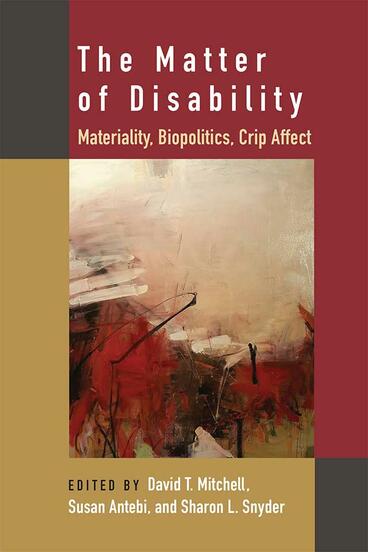The Matter of Disability
Materiality, Biopolitics, Crip Affect
Breaks new ground by exploring the limits and transformations of the social model of disability
Description
The Matter of Disability returns disability to its proper place as an ongoing historical process of corporeal, cognitive, and sensory mutation operating in a world of dynamic, even cataclysmic, change. The book’s contributors offer new theorizations of human and nonhuman embodiments and their complex evolutions in our global present, in essays that explore how disability might be imagined as participant in the “complex elaboration of difference,” rather than something gone awry in an otherwise stable process. This alternative approach to materiality sheds new light on the capacities that exist within the depictions of disability that the book examines, including Spider-Man, Of Mice and Men, and Bloodchild.
David T. Mitchell is Professor of English at George Washington University. Susan Antebi is Associate Professor of Spanish and Portuguese at the University of Toronto. Sharon L. Snyder is Instructor of Honors and Women's, Sexuality, and Gender Studies at George Washington University.
Reviews
“The attention to larger critiques, the desire to cross barriers, and the formulation of disability as ‘matter in motion,’ with its ‘alternative agencies of becoming’ all position this collection as theoretically and politically innovative, potent, and generative. The book’s introduction is superb—engaging, extensive, with a sharp sense of the trajectory and significance of the collection and its lively, fascinating range of topics, texts, and films.”
—Stacy Alaimo, author of Bodily Natures: Science, Environment, and the Material Self
“Adapting research in new materialism, affect theory, and critical race studies, this theoretically innovative collection displaces the classical humanist Subject, unitary site of rational intellect and purposive agency. The starting point for colleagues and students who are looking at disability as a way to rebuild the humanities. The Matter of Disability is a bellwether for where disability studies is going and why the matter of embodiment matters. The editors have thrown down the gauntlet to scholars in other fields to ‘come on in.’”
—Michael Davidson, University of California, San Diego
"The essays in this volume, especially if read concurrently, provide a
- Gesine Wegner, Philipps-Universität Marburg
fresh perspective and a valuable contribution to recent disability studies scholarship and critical theories of embodiment more generally. For readers with little to no prior knowledge in posthumanism and/or disability studies, The Matter of Disability may prove challenging at times. Yet, while the book expects much of its readers, readers can also expect much in return."
—Amerikastudien / American Studies

